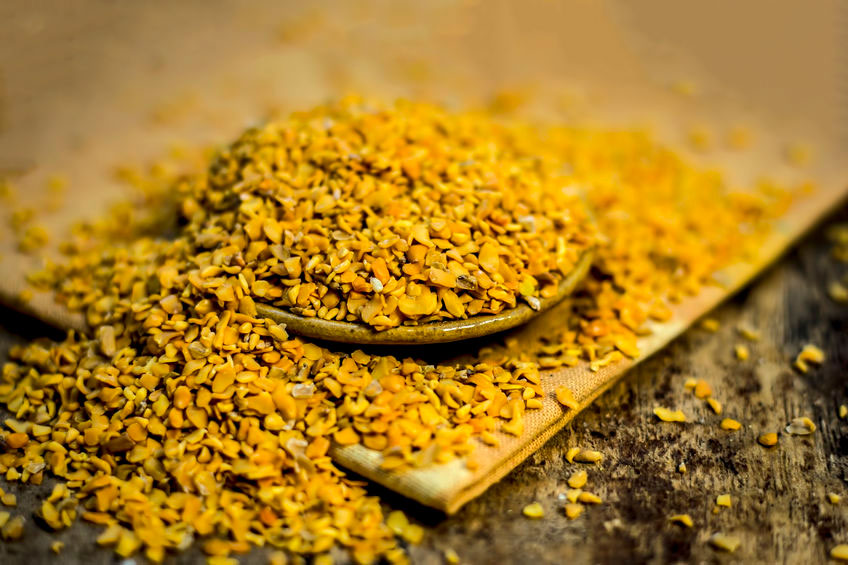Fenugreek is a middle-eastern spice and has been used for thousands of years in curry and chutney. Also known as methi in India it is also eaten as a salad, and used as an artificial maple syrup flavouring. It is a common food and one of the oldest medicinal herbs known. Women have taken fenugreek for increasing breast milk in the Middle East, India and North Africa since ancient times. But does it really work? Will fenugreek increase breast milk?
This article
This article looks at how to increase milk supply, whether fenugreek can help, potential side effects of taking fenugreek and the suggested doses recommended by lactation professionals.

Increasing milk supply
How much breast milk a mother makes depends on efficient removal of milk from her breasts by a baby or a pump. The more milk that is taken from the breast, the more milk will be made in the breast to replace it. If breastfeeding is going well, this will generate the perfect volume of milk for a baby or even for twins. If a baby is not getting enough milk, it can be helpful to identify the reasons for your low milk supply with a breastfeeding specialist or IBCLC lactation consultant before reaching for a galactagogue (a food, herb or medication that increases milk supply). Bear in mind if you do use a galactagogue such as fenugreek, frequent breast drainage will still be needed. There are also lots of ideas in How to Make More Breast Milk to increase a milk supply.
Will fenugreek increase breast milk?
Fenugreek is regarded anecdotally as an effective galactagogue. Two recent studies found taking fenugreek increased milk supply compared to not taking it or taking a placebo (an inert substance that has no effect other than the belief that it will bring positive results).12 Another small study looked at the effects of a mixed supplement of fenugreek, ginger and turmeric and found that it did increase the participants’ breast milk volume.3 In contrast some women find fenugreek doesn’t seem to make a difference to their milk supply, and others have felt it reduced their milk supply. Two commentaries query whether a psychological or placebo factor could be causing increased milk.45
How might fenugreek work?
Mortal and Mehta explain how fenugreek might influence milk production although the exact mechanism is not known:
It is thought that fenugreek stimulates sweat production, and since the breast is a modified sweat gland, fenugreek may affect breast milk production in this manner. It has also been suggested that fenugreek may have oestrogenic activity.

Is fenugreek safe when taken as a supplement?
Taken as a spice or natural flavouring, fenugreek is “generally recognized as safe” (GRAS) by the US Food and Drug Administration (LactMed, 2025). However when fenugreek is taken in much higher “medicinal doses” there are a number of possible side effects, just as with any drug.
Check with your doctor
Always check with your health professional before taking fenugreek in medicinal amounts so they can discuss all the harms and benefits.6
Side effects
All drugs and herbs (in medicinal amounts) can have side effects and potential interactions with other drugs or herbs you may be taking—including fenugreek.7 Potential side effects and cautions include:
- Fenugreek is not recommended during pregnancy as it could cause uterine contractions giving a possible risk of miscarriage (Shawahna, 2018)
- Allergic reactions have been reported in individuals who are sensitive to chickpeas, peanuts and other legumes89
- Nausea and vomiting may be a side effect for mother and fenugreek may cause diarrhoea in both mother and baby (Shawahna, 2018)
- Fenugreek may lower cholesterol and blood sugar at high doses (hypoglycaemia) and caution should be taken with diabetic mothers (LactMed, 2025; Shawahna, 2018)
- Fenugreek has anticoagulant effects so is not compatible with bleeding disorders (Shawahna, 2018). It can interact with warfarin to cause bleeding (LactMed, 2025)
- A side effect could be a smell of maple syrup in urine, sweat, stools and possibly in breast milk (Lactmed, 2019)
- Fenugreek may make asthma worse and lower blood levels of potassium (LactMed, 2025; Shawahna, 2018)
- Fenugreek could be associated with low blood pressure (Shawahna, 2018).
Further information about research studies using fenugreek can be found online at LactMed and for a review of both the harms and benefits of taking fenugreek medicinally see the discussion by Shawahna et al.10
Diabetic mothers, thyroid disorders
If a mother has diabetes, or thyroid issues and is considering taking fenugreek, she should check with her doctor. Dr Jack Newman, a Canadian paediatrician and breastfeeding expert, recommends regular testing of the mother’s blood sugar and thyroid function:
As for human studies, there are a few, but only in diabetics, that showed a possible mild lowering of blood sugars. If a breastfeeding diabetic is taking medications to lower her blood sugar, she should make sure to test it regularly. Another issue that has come up is that fenugreek may interfere with thyroid function. I have tried to find the sources for this concern and have not found a study that proves such a connection. If the mother is worried, she should have her thyroid function tested.
Marasco and West have noticed a suspicious association for a lowered milk supply when mothers with low thyroid (hypothyroid) take fenugreek (Marasco and West, 2020, p228). More research is needed.
Allergies and asthma
Fenugreek is in the same family as peanuts. Jack Newman states:
it has been suggested that because fenugreek is in the same family as peanuts, those allergic to peanuts should not take it. However, just because two foods are in the same family does not mean a mother who is allergic to one food will be allergic to all.
West and Marasco suggest trying a tincture—herb preparations that use alcohol with water to make a fairly dilute liquid extract—rather than capsules if a mother is prone to allergies or asthma.11
Is fenugreek safe for my baby?
Fenugreek is rated L3 limited data—presumed compatible [paywall] with breastfeeding in Hale’s Medications & Mothers’ Milk Online 2020. Hale says the transfer of fenugreek into milk is not known but that negative effects from taking fenugreek have only rarely been reported. Under “paediatric concerns” he mentions baby’s urine may have a maple syrup odour and that one case of suspected gastrointestinal bleeding in a premature baby has been reported. See e-lactancia for their comment on breastfeeding compatibility which they rate as “Compatible/Safe product”.12
Gassy baby, upset tummy possible
Some mothers report their baby is fussier or may seem to have tummy ache or have gas, green poop or even diarrhoea when they take a medicinal lactation dose of fenugreek. Kelly Bonyata explains:
Possible side effects for baby Most of the time, baby is unaffected by mom’s use of fenugreek (except that more milk may be available for baby). Sometimes baby will smell like maple syrup, too (just like mom). However, some moms have noticed that baby is fussy and/or has green, watery stools when mom is taking fenugreek and the symptoms go away when mom discontinues the fenugreek. Fenugreek can cause GI [Gastrointestinal] symptoms in mom (upset stomach, diarrhea), so it’s possible for it to cause GI symptoms in baby too. Also anyone can have an allergic reaction to any herb, and fenugreek allergy, though rare, has been documented.
Occasionally green copious nappies could be due to other causes e.g. a potential increase in milk production resulting in oversupply. A situation more likely if a mother was taking fenugreek when her milk supply was already adequate.

What dose of fenugreek will increase milk supply?
Marasco and West state the medicinal dose of fenugreek that tends to be recommended to promote milk supply is three to six grams of powdered seed each day (Marasco and West, 2020). Herbs can be bought as powder, tablet, capsule, tinctures and teas. Different forms may suit different mothers, and individual mothers will vary in the dose of fenugreek needed to have an effect, and the amount of fenugreek in each capsule can be very variable. A table comparing dosage for capsules, powder, teas and tinctures can be found in Fenugreek Seed for Increasing Milk Supply, by Kelly Bonyata.
Start with a lower dose
Taking less than the medicinal dose above may not help increase your milk supply.13 However, starting with a low dose at first, and gradually increasing it, will give you a chance to see if fenugreek upsets your tummy or seems to upset your baby.
Strong smell
Canadian paediatrician and breastfeeding author Jack Newman recommends taking enough fenugreek so that you can smell it on your skin.
Herbal remedies are not standardized. You may see bottles of fenugreek and blessed thistle with the number of milligrams in each capsule listed but nobody really knows how much of the active ingredient is in each capsule.
- Fenugreek has a distinct smell. Ensure the capsules are fresh and give off a strong odour.
- When you are taking enough fenugreek, you will be able to smell it on your skin, in your sweat, and/or in your urine.*
*NOTE: Check dose with your naturopath or functional doctor or other knowledgeable healthcare professional.
Fenugreek and blessed thistle together?
Jack Newman recommends taking fenugreek and blessed thistle together in his breastfeeding clinic and writes about dosages here.

How soon will fenugreek work?
Jack Newman 14 says fenugreek (and blessed thistle) should work quickly and within 24 hours and if there is no effect by 72 hours it probably won’t work at all. Newman adds that fenugreek seems to work best in the first few weeks after birth, but experiences vary. Kathleen Huggins15 and Kelly Bonyata16 both cite 24 to 72 hours to see an increase in milk after starting fenugreek. Kelly Bonyata adds that it may take two weeks to work however, and points out that fenugreek does not work at all for some mothers.
How long do I take fenugreek?
Most mothers have found that they can stop using fenugreek once milk production has increased to an appropriate level (Huggins, 2015).
Where can I get fenugreek?
Health food stores and online stores: always check reviews and herb sources carefully.
Summary
Fenugreek is widely regarded as helpful for increasing a milk supply however some mothers have felt their milk supply reduced with fenugreek. As with all herbs and medications there can be side effects or interactions with other drugs when taken at medicinal doses and allergic reactions could be possible. The transfer of fenugreek into breast milk is not known, some mothers find their babies are fussier or have a tummy upset when they take fenugreek while breastfeeding. Always check with a knowledgeable health professional before taking any herb including fenugreek in medicinal doses.